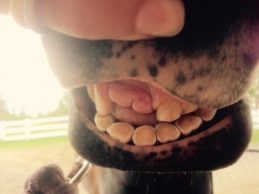Dentistry

Regular dental examination and treatment is essential for every horse whether it is a retired paddock pet or a successful competition or racing animal. Dental treatments, performed every 6 to 12 months, are recommended to prevent painful conditions of the mouth. There is no doubt that infrequent or inadequate dental care results in pathology that adversely affects health and performance.
Some of the signs that your horse might have a dental related disease include;
- Loss of condition
- Quidding (balling up partially chewed hay and spitting it out)
- Food packing into cheeks
- Dropping hard feed, slow to eat up, holding head to one side whilst eating
- Nasal discharge
- Subtle changes in ridden performance
- Unsteadiness in the rein contact, stiffness to one side, rearing, bolting
- Resistance to have the bridle put on
- Excessive salivation
- Lymph node enlargement
- Foul-smelling breath
- Head shyness or shaking
- Facial swellings
- Presence of whole grain in the manure
All dentistry is performed under sedation with the horses head elevated using a veterinary only power float. Our vets use head torches and dental mirrors to illuminate the patient’s mouth enabling visual dentistry – we look, diagnose and treat appropriately.
Occasionally a tooth may require extraction. We have a full range of equipment to facilitate intraoral extractions in the standing sedated horse at the hospital and the extractions can be done as a “day surgery”. Dental procedures requiring sinus surgery can also be performed at the hospital with specialist equine surgeons.







